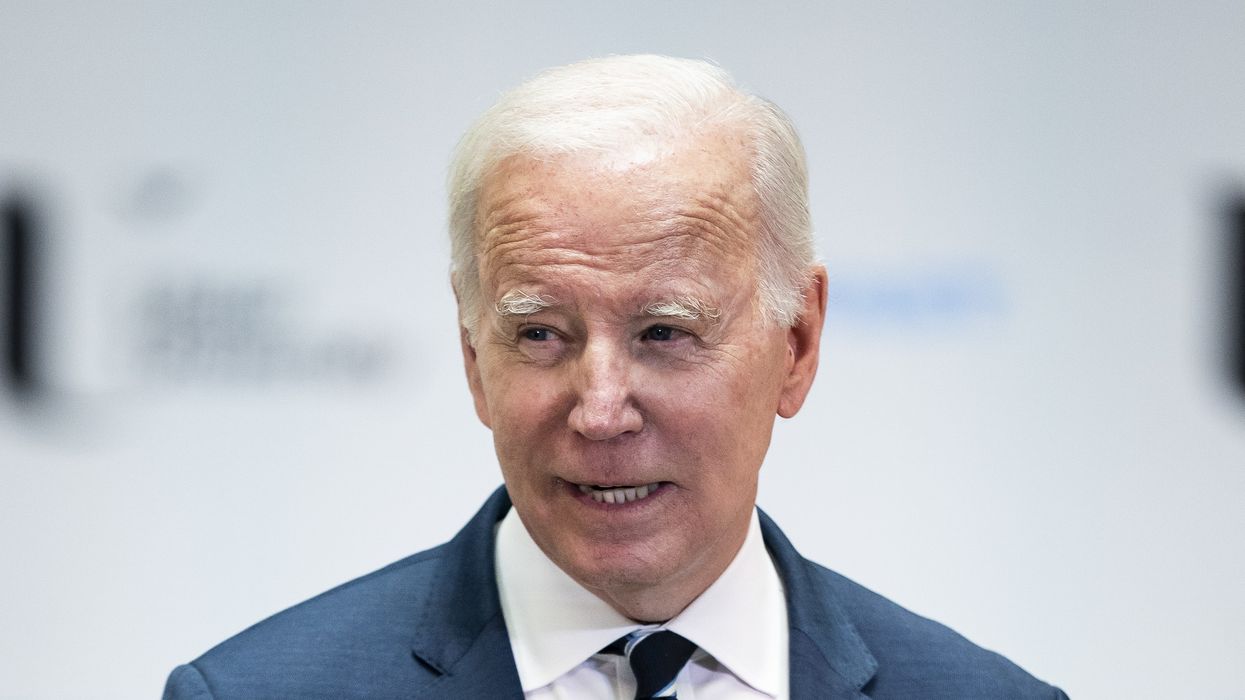Joe Biden made a big mistake with Israel. Trump would never have made the same error, says Bella Wallersteiner

Joe Biden has been accused of failing Israel with his Middle East stance
| PAPolitical commentator Bella Wallersteiner says Donald Trump's "unorthodox" approach to the Middle East was a huge success
Don't Miss
Most Read
Latest
Iran's missile and drone attack aimed at Israel, and Israel's remarkable success in intercepting 99 per cent of them, marks a significant escalation in tensions in the Middle East. This brazen move by the Iranian theocracy raises the question: Would Iran have dared to take such an aggressive action under President Trump's watch?
The Middle East has long been a hotbed of conflict and instability, but under the Trump administration, the region saw a significant reduction in violence and a shift towards stability. While Donald Trump's unorthodox approach to foreign policy often drew criticism, there's no denying that his policies led to tangible improvements in the security landscape of the Middle East.
One of Trump's first actions as president was to make defeating Isis a top priority. Under his watch, the US-led coalition successfully liberated key ISIS strongholds, drastically reducing the terrorist group's territorial control and capabilities. By taking the fight directly to the extremists, Trump helped to diminish their ability to wreak havoc across the region.
Trump's tough stance on Iran was a game-changer for the Middle East. By withdrawing from the flawed Iran nuclear deal and imposing tough sanctions on the Iranian regime, Trump sent a clear message that Iran's malign activities would no longer be tolerated. This approach curtailed Iran's destabilising influence in countries like Syria, Yemen, and Iraq, leading to a more secure environment for their citizens.
Trump's approach to the Middle East was unconventional, to say the least. Rather than adhering to traditional diplomatic norms, Trump pursued a bold and innovative strategy that prioritised results over process. His willingness to think outside the box and challenge the status quo was instrumental in bringing about the Abraham Accords which shattered long-standing barriers and paved the way for greater cooperation, stability, and prosperity in the region.
The Abraham Accords led to a series of agreements between Israel and several Arab countries, including the United Arab Emirates, Bahrain, Sudan, and Morocco. These agreements normalised diplomatic relations, opened up trade and tourism, and fostered greater cooperation between Israel and its Arab neighbours.
In a region where such normalisation was once unthinkable, the Abraham Accords represented a seismic shift in attitudes towards Israel and laid the groundwork for a more peaceful and prosperous Middle East.
Trump’s son-in-law and former Senior Advisor, Jared Kushner, was a key figure in shaping Trump’s approach to the Middle East. While his role was often met with criticism and scepticism from the Washington establishment, Kushner's record in the region was one of significant achievements. Kushner's vision for the Middle East went beyond political agreements; he emphasised economic development as a cornerstone for peace. Through initiatives like the "Peace to Prosperity" plan, Kushner aimed to unlock the region's economic potential and create opportunities for its people, thereby reducing the root causes of conflict and extremism.
Following Iran’s heinous attack on Israel over the weekend, House Speaker Mike Johnson, took to social media, blaming the Biden administration's appeasement of Iran.
Calling on world leaders to bolster their support for Israel, Johnson wrote: "I will continue to engage with the White House to insist upon a proper response." Johnson's remarks highlight a growing sentiment that President Biden's approach to the Middle East is failing, particularly in its lack of proper support for Israel and its weakness in the face of Iran.
Biden came into office promising a return to diplomacy and a new approach to the Middle East. However, his record thus far has been marked by inconsistency, indecision, and a lack of strategic vision.
John Bolton, former National Security Advisor to President Trump and a long-time hawk on foreign policy, has never been one to mince words but his is a perspective worth listening to, given his deep understanding of the complexities of Middle East politics. Bolton has been particularly critical of Biden's eagerness to rejoin the Iran nuclear deal, calling it a "return to failed diplomacy."
According to Bolton, the deal does little to curb Iran's nuclear ambitions and only serves to embolden the regime in Tehran. By turning a blind eye to Iran's malign activities and regional aggression, Biden has emboldened the regime in Tehran and undermined the security of US allies, including Israel and the Gulf states.
The Financial Times reported on April 11 that Biden had privately urged America's allies to pressure Iran to refrain from attacking Israel amid escalating tensions in the Middle East. Despite Biden's diplomatic efforts, Iran went ahead with its attack on Israel, underscoring the failure of his approach to managing relations with Tehran. Biden's private urging of allies to pressure Iran highlights a fundamental flaw in his approach: a lack of credible deterrence. While diplomatic overtures have their place, they must be backed by concrete actions to be effective. Iran's decision to proceed with the attack on Israel despite Biden's warnings shows that Tehran does not take U.S. threats seriously under Biden's leadership.
Biden's approach to the Israeli-Palestinian conflict has also been inconsistent and ineffective. Biden has regularly ratcheted up the rhetoric against Israel in response to stalled ceasefire negotiations, but in doing so sends the wrong message and applies pressure to the wrong party. Instead of holding Hamas accountable for its rejection of peace deals and its use of hostages as bargaining chips, Biden's criticism of Israel undermines America's closest ally in the region and gives Hamas a free pass.
In a recent statement, President Biden called Netanyahu’s approach to the conflict a "mistake." By questioning Israel's approach to dealing with the Hamas threat, Biden was essentially questioning Israel's right to self-defence, a fundamental principle enshrined in international law. Biden's criticism also suggested a fundamental misunderstanding of the complex dynamics at play in the Israeli-Palestinian conflict.
Israel is not waging war against the Palestinian people; it is targeting Hamas terrorists who use civilians as human shields and launch attacks from densely populated areas. By painting Israel's actions with a broad brush, Biden overlooked the nuanced realities on the ground and provided Hamas and its puppet masters in Tehran with a propaganda victory.
Whether it's been through his handling of the Afghanistan withdrawal, his approach to Iran, or his seemingly lacking ‘ironclad support’ for Israel, Biden has managed to strain relations with countries that should be America's strongest partners in promoting peace and stability in the Middle East.
While Trump's presidency was fraught with controversy, divisiveness, and questionable decisions, his policies in the Middle East achieved what many thought impossible. It’s time Trump’s successors begrudgingly acknowledged his accomplishments in the region so that they might build on these gains and work towards a peaceful and prosperous Middle East.










